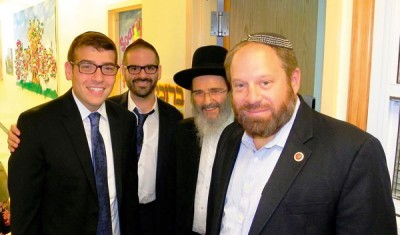
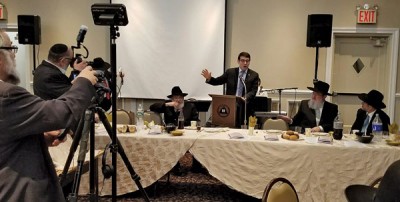
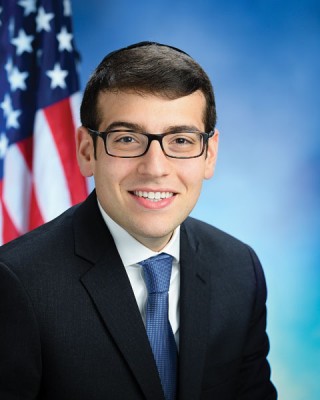
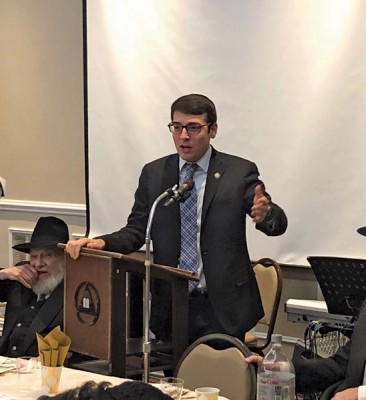
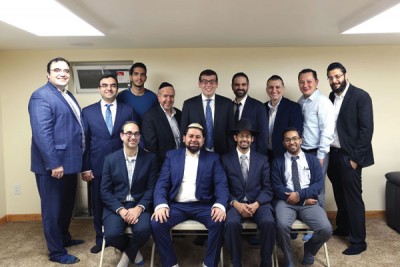
Our elected officials have an important task before them: They stand at the crossroads of getting things done and letting things slide unnoticed. They also represent their constituents in consideration of all relevant legislation. Their choices in all aspects of their work can affect us in great waves or in small nudges, but affect us they will. What motivates a person to take up the mantle and responsibility for thousands of people? What steps do they take to attain the vantage point which empowers them so? I interviewed Queens’ very own Daniel Rosenthal, who is the Assemblyman for the 24th District, to present our readers with answers to these questions. The following interview presents our readers with a rare opportunity to experience an “inside track” in the world of politics. It also gives our readers an appreciation of the work, ethos, and efforts of the people who center their life on public concern.
BJL: Daniel, it’s a pleasure to talk to you. Can you please introduce yourself and tell us which parts of Queens fall within your district?
Daniel Rosenthal: Sure. I was recently elected to the New York Assembly; I represent Kew Gardens Hills, Kew Gardens, College Point, and Whitestone. I also represent most of the neighborhoods of Briarwood and some of Forest Hills.
BJL: I actually know you from our time together in school, but please tell our readers a little about yourself and how you became involved in the political arena.
DR: I first got involved in local politics when I was at Lander College For Men. I was first interested in working with the local campaigns. Needless to say, I fell in love with the work and volunteered in other capacities after my first stint. After I graduated from Lander’s, I joined Councilman Rory Lancman’s office and have been working with him up until I ran for office and got elected.
BJL: Did you always have a desire to enter politics or was it something you developed as you worked in the field?
DR: I was interested from a young age. I have distinct memories as a child enjoying televised presidential debates with my father. In college I had the opportunity to really try my hand in the field. I asked one of my professors to help me get my feet wet and he hooked me up with a Congressional campaign. It was a short six-week election, but I learned a lot from the experience. I loved the fast pace and interaction with people from all walks of life. From that point on I knew where I would make my home. After that first gig I moved on to help a state assemblyman and then throughout college, on my off time, I would intern with other campaigns.
BJL: How old were you when you began?
DR: I was roughly 19 or 20 when I started; I am now 26.
BJL: Amazing. In six short years you have come so far! How do you see your political future unfolding?
DR: It’s actually very interesting. When I first got involved, I was extremely excited about campaigning. I was fascinated with the strategy and planning. But after I graduated college and after working on a winning campaign, I was offered a job as District Director. I accepted the offer, which gave me different experience and perspective. Working as Rory Lancman’s District Director, my focus shifted from politics to community activism. I found that work much more rewarding and in tune with my interests.
The main responsibility of District Director is helping calling constituents with anything and everything. Requests range from ensuring a faulty street light is fixed to navigating SNAP benefits. I was involved in major requests and relatively minor ones as well; the main thing was that I made sure people’s requests were answered. I went to civic meetings and engaged with many diverse crowds regarding community issues and growth. Essentially, my task was to advocate for my constituents.
An example of this would be how we were able to prevent the DOT (Department of Transportation) from placing a bus lane on Main Street. The storeowners were concerned that having a bus lane would back up traffic, take away parking, and generally make work and living uncomfortable. We were able to get DOT to come down and discuss the matter out and succeeded in upholding our constituents’ wishes.
BJL: Were there any other reasons as to why you decided to switch gears from campaigning to community work?
DR: The work I did as District Director allowed me to experience things from the ground up, and I just felt like I had come to the right place. When you feel that spark you just know that you want to continue doing what makes you happy.
BJL: Your position gives you influence to make certain changes in the community. Are there any particular issues you hope to work on?
DR: Well the main thing is that we continue to operate our services in a manner that pleases our constituents. Everything we do needs to resonate with them and has to service them in one way or another.
BJL: Can you give us specifics?
DR: Sure. We are basically the intermediaries between a person and a governmental agency. When someone has called 311 and received no results, they call us. We can contact the appropriate governmental agency directly.
BJL: As Assemblyman, you have a say in the legislative process as well. You can weigh in on the laws that will be written or have been written. Can you please inform our readers about your legislative aspirations?
DR: I care that our local institutions are secure. By that I mean that they receive appropriate funding. I also want to make sure that those who opt for private schooling receive their taxpayer’s share of state assistance. This goes part and parcel with the overarching concern that the community’s quality of life issues are being attended to.
BJL: What do you mean by “quality of life issues”?
DR: I can certainly give context. My predecessor had a bill in the state assembly which would allow homeowners to opt out of getting a tree planted in front of their house. Once a tree is planted it is almost impossible to get it removed. Sometimes these trees cause massive problems for homeowners who are subsequently unable to deal with the problem. When I say that I am interested in improving the community’s quality of life, I am referring to potential issues that can be avoided with reasonable foresight and a little creativity. The legislative process offers great girth if we utilize it correctly.
BJL: I want to ask you now about an issue that I personally feel stands out: the drug epidemic. Can you please tell our readers what steps the legislature is taking to deal with this never-ending nightmare?
DR: There is a growing drug problem that has permeated our community. No one has been left untouched; we all either know someone struggling with this issue or are connected to someone who is struggling with it.
Drug problems are very serious health issues and we need to make sure that those seeking help are able to receive it, that insurances are covering the requirements, and that Narcan be available in buildings for use if, G-d forbid, the need ever arises.
BJL: Please explain more about the advocacy required to push insurance. What does that involve?
DR: The treatment offered for those seeking help is often very expensive and insurance often doesn’t cover what it should. Drug addiction is a serious issue, and if someone needs help, it should not be dependent upon his or her ability to afford it. We need to make sure that insurance companies cover their share.
BJL: Please talk about your work regarding Narcan regulation. Narcan is medication used to pull people out of overdose; the drug is administered via shot or inhalation. Do you mean to say that it will be available in all buildings, like fire extinguishers?
DR: Yes, along those lines. We have not drafted the bill yet but we are looking mimic the widespread success of implementing defibrillators. We aim to have Narcan available everywhere and hope that people train in its administration along with other emergency methods.
BJL: In consideration of all the recent overdoses, it is comforting to know that the issue is being recognized and dealt with from a legislative perspective. Being that this interview is an opportunity for you to address the Bukharian community directly, are there any messages that you would like to share?
DR: It’s extremely important for a community to go out to vote. It gives the community a voice in the elective and legislative processes, and also gives more incentive for elected officials to respond to the community’s needs and wants.
The Bukharian community in particular has made tremendous strides in past few years. A lot of organizations have become more organized and have been successful in voicing their concerns and allocating public money towards needs such as afterschool programs for children, etc. The positive movement I have noticed in the past seven years has been a real source of pleasure for me, especially since I know that these changes don’t happen change overnight. I have had the ability to see plans develop into actual products and am happy to see the community benefit.
BJL: What kind of work do you feel would further the community’s political involvement?
DR: There must be a more active and direct political role, a grassroots movement, for ensuring that people are registered to vote and are actually following through. The truth is that we elected officials are nothing without the support of our community members. When we propose legislation desirable to our constituents, we need our constituents to push the Legislature to adopt the bills.
BJL: Assemblyman Rosenthal, thank you very much for your time.
Our readers can reach Assemblyman Daniel Rosenthal by visiting his office at 159-06 71st Avenue in Flushing, or calling 718-969-1508.
The Bukharian community continues to grow in all aspects of its social and political life. We may not know what the future has in store, but we can take advantage of the time and influence that can direct its course. Our politicians are elected based on our desired goals, but our relationship with them doesn’t need to end there. If we take a more active role in the political world, we may find that it is more responsive to our needs.
An Interview With Assemblyman Daniel Rosenthal
Typography
- Smaller Small Medium Big Bigger
- Default Helvetica Segoe Georgia Times
- Reading Mode




